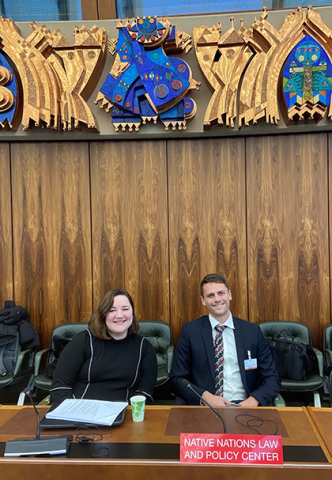On October 30th, we welcome you to join the Native American Law Students Association and the American Constitutional Society (ACS) for a panel discussion with former tribal judge Cheryl Demmert Fairbanks (Tlingit/Tsimshian) and current tribal judge JoAnne Cook (Grand Traverse Band of Ottawa and Chippewa Indians). The panel will open with a grounding from Judge Fairbanks. The panel will explore the unique ways that tribal judges function in their communities, how Indigenous justice systems are molding restorative outcomes for community members, and where Indigenous justice is going next.
The event will take place on Wednesday, October 30th, at 12:15pm. Both judges will attend via Zoom Webinar and we will be able to welcome guests either in person or through the Zoom Webinar.
Lunch will be provided for those who are attending in person and RSVP by October 23rd.
Join us! (https://forms.gle/gAEPSCWUYf5TMPWr6)

Bolstering UCLA School of Law’s efforts to improve the lives of Native people throughout California and the country, the San Manuel Band of Mission Indians has awarded a $2.2 million grant to further support the ongoing work of the law school’s Tribal Legal Development Clinic.
The Native Nations Law & Policy Center will host a guest lecture on Indigenous Peoples’ Day by Dorothy Alther, Legal Director of California Indian Legal Services (CILS). The guest lecture will begin promptly at 3PM on Monday, October 14th in the Capello Courtroom (Room 1310) at UCLA Law.
-
Immediately following the lecture, the NNLPC will host a reception in the Shapiro Courtyard to honor the San Manuel Band of Mission Indians (SMBMI) for its renewed gift of $2.2 million dollars to fund the operation of the Tribal Legal Development Clinic at UCLA Law.
-
We will have brief presentation by Professor Emerita Carole E. Goldberg and third-year law student, Aine Lawlor, on the impact SMBMI’s renewed gift on UCLA Law students and Indian Country. Hors d’oeuvres and refreshments are to be served.
The Williams Institute's 2024 NYC Fall Salon will take place on Thursday, September 12 from 6:00-8:30 PM at the Meta office in Hudson Yards.
We invite you to join our discussion on the current state of LGBTQ+ law and policy and what’s at stake in the upcoming November election and beyond.For tickets to our 2024 NYC Fall Salon, please visit: https://bit.ly/NYCFallSalon24RSVP ends on September 4, 2024.
For more information, please contact Williamsdev@law.ucla.edu.

Four UCLA School of Law professors, including leading scholars in election law, critical race studies, Native American law, and U.S.-China relations, have received appointments to endowed faculty chairs.
Faculty chairs acknowledge the distinction of the law school’s outstanding professors and are made possible by the generosity of UCLA Law’s alumni and friends. UCLA Law has 70 full-time faculty members and 39 endowed chairs.
The Native Nations Law JD Specialization comprises courses focusing on tribal legal systems, federal Indian law, and international advocacy for Indigenous rights. A renowned resource in support of Native Nations, UCLA Law’s Native Nations Law & Policy Center advances Indian nations’ laws and institutions in furtherance of tribal sovereignty and rights of self-determination.
Coursework Requirement
J.D. students are required to complete five courses with a grade of B- or better in each course to complete the program.
- Mandatory Course
-
Group A: Indian Law Electives
Students are required to take at least two courses from this list.
LAW 287Federal Indian Law II
LAW 301Art and Cultural Property Law
LAW 444Indigenous Peoples in International Law
LAW 728Tribal Legal Development Clinic
Federal Indian Law I is a prerequisite for Federal Indian Law II. Exceptions to this policy are at the discretion of the Native Nations Law Specialization Committee.
Priority enrollment for the Tribal Legal Development Clinic is given to Indian Law specialization candidates.
Advanced Tribal Legal Development Clinic satisfies Law 799 as a course.
-
Group B
The sum of Groups A and B must equal four or more courses.
Students must take at least two courses or two additional courses from Group A.
One-unit courses will count as only half a course for this requirement.
LAW 209Real Estate Finance
LAW 212Federal Courts
LAW 214Civil Rights
LAW 216Administrative Law
LAW 228Mergers & Acquisitions
LAW 249Tax Aspects of Mergers & Acquisitions
LAW 250Secured Transactions
LAW 251Business Strategy and Corporate Governance
LAW 261Employment Law
LAW 266Critical Race Theory
LAW 270Public International Law
LAW 273International Human Rights Law
LAW 274Trademark Law
LAW 286Land Use
LAW 290Environmental Law and Policy
LAW 291Taxation of Business Enterprises
LAW 293Public Natural Resources Law and Policy
LAW 302Copyright Law
LAW 305Entertainment Law
LAW 307Intellectual Property
LAW 317Family Law
LAW 319Election Law
LAW 326Health Law and Policy
LAW 350Energy Law and Regulation
LAW 419Real Estate Transactions
LAW 443Comparative Environmental Law
LAW 463Regional Human Rights Protection: The Inter-American System
LAW 490Renewable Energy Project Finance
LAW 527Natural Resources Law
LAW 542Race, Sexuality, and the Law
LAW 582Brands: Constructing Identity
LAW 612Reproductive Rights and Justice
LAW 617Special Topics in Family Law
LAW 692Water Law
LAW 717International Human Rights Clinic
LAW 728Tribal Legal Development Clinic
LAW 738California Environmental Legislation and Policy Clinic
LAW 739Community Economic Development Clinic
LAW 741Environmental Aspects of Business Transactions
LAW 832Voting Rights Policy and Practice
LAW 837Domestic Violence Prevention Practicum
LAW 838Civil Rights Litigation Practicum
A seminar, course or Independent Study may be taken with the approval of a Native Nations Law Specialization Committee.
A Part-time or Full-time Externship may be taken with the approval of the Native Nations Law Specialization Committee.
Law 728 - Tribal Legal Development Clinic cannot count twice in fulfilling the five course requirement.
Participation in the National NALSA Moot Court Competitions will satisfy Law 762 as a course.
Course or Independent Research with non-NNLPC Core or Affiliated Faculty Members
For courses or independent research with non-NNLPC Core or Affiliated Faculty, you may petition for pre-approval by submitting a description of the course or independent research to a member of the Specialization Committee. You should note that it may not always be possible to pre-approve independent research, in which case a decision will be made once the student submits a completed project.
Students may petition the Specialization Committee to have other relevant courses or independent studies counted toward the specialization. The Center faculty may also approve, on a case-by-case basis, specialization credit for appropriate courses taken either abroad as part of Foreign Legal Studies, or as a transfer or visiting student. The list of courses (including seminars and clinics) that satisfy the specialization will be reviewed annually and revised as appropriate by the Specialization Committee, in coordination with the Records Office. Students are encouraged to look into the specifics of the syllabi of each course and to meet with the faculty advisors to ensure they select courses that best achieve their personal educational goals.
Students may petition the Specialization Committee for permission to take Federal Indian Law I and Federal Indian Law II concurrently, or for permission for the Tribal Legal Development Clinic to serve as a pre-requisite to Federal Indian Law II, requests which may be granted, but only in exceptional circumstances.
Students pursuing the J.D. Specialization in Native Nations Law do not receive priority enrollment for any course except the Tribal Legal Development Clinic. However, ultimate enrollment decisions remain at the discretion of the Clinic director. Students are encouraged to enroll for other courses as early as possible in the enrollment period for maximum flexibility.
Please note that not all courses will be offered every year.
Externships
Students pursuing the Specialization in Native Nations Law may pursue full- or part-time externships relating to Indian law for credit towards the specialization’s Group B coursework requirement. A student wishing to use an externship as a qualifying course must receive the prior consent of the Native Nations Law Specialization Committee. Consent will require a demonstration that the externship will provide exposure to relevant substantive areas of law. Regardless of the number of externships or externship units a student completes, a student may use externships to count, at most, as one course.
